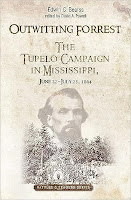New Arrival:
• Outwitting Forrest: The Tupelo Campaign in Mississippi, June 22 - July 23, 1864 by Edwin C. Bearss, ed. by David A. Powell (Savas Beatie, 2023).
For those seeking the best single source for learning about the 1864 Tupelo campaign and battle in Mississippi, the current gold standard is Tom Parson's Work for Giants: The Campaign and Battle of Tupelo / Harrisburg, Mississippi, June-July 1864 (2014), which was also expertly condensed by its author as a Blue & Gray magazine feature. Before that, an excellent summary of the campaign and battle was placed in the middle section of Ed Bearss's Forrest at Brice's Crossroads, published by Morningside (1979, R-1987).
A number of 'firsts' were produced by Bearss during his long and distinguished government service career, among them many detailed campaign/battle narratives and sets of battlefield troop movement maps that together provided the groundwork for subsequent studies (including a number of his own). One of those seminal works is the 1969 publication The Tupelo Campaign, June 22-July 23. A Documented Narrative & Troop Movement Maps. I haven't taken the time to closely compare the appropriate parts of Bearss's Morningside title with his 1969 monograph, but several chapter headings are closely shared and the wording used in the opening passage of both is remarkably similar.
Regardless of the amount of shared material, it's always worth preserving (and, just as important, making more widely available) those works that 'started it all' and are of such timeless quality as to heavily influence more modern titles written decades later. The latest installment of Savas Beatie's Battles & Leaders series and freshly edited by David Powell, Bearss's 1969 manuscript has now been reissued under the title Outwitting Forrest: The Tupelo Campaign in Mississippi, June 22 - July 23, 1864.
Though often overshadowed by the stunning Confederate victory at Brice's Crossroads that preceded it by mere weeks, the campaign had significant consequences. By keeping Confederate forces in northern Mississippi occupied and away from the Union Army's main effort in the West, the Tupelo Campaign materially aided Sherman's advances in North Georgia.
From the description: "The engagement came about when Maj. Gen. A. J. Smith marched a Federal expeditionary force (his XVI Army Corps) into northern Mississippi in early July 1864. The thrust forced a response, the largest of which was delivered by the combined Confederate cavalry of Stephen D. Lee (who was in general command) and Forrest.
The tactical result was a Union defensive success. The larger Confederate strategic play, however—one that might have impacted the course of the war in the Western Theater—would have been to unleash Forrest on a raid into Middle Tennessee to destroy the single line of railroad track feeding and supplying the Union armies of William T. Sherman in his ongoing operations around Atlanta. Instead, his troopers were contained within the Magnolia State, where his combat effectiveness was severely curtailed."
In addition to penning a new foreword discussing the context and significance of Bearss's original monograph, Powell appends some of Bearss's chapter notes. Six new maps were also commissioned for this edition.



Thanks for the coverage. It is a nice book and we are very pleased to release it. --Ted Savas
ReplyDelete